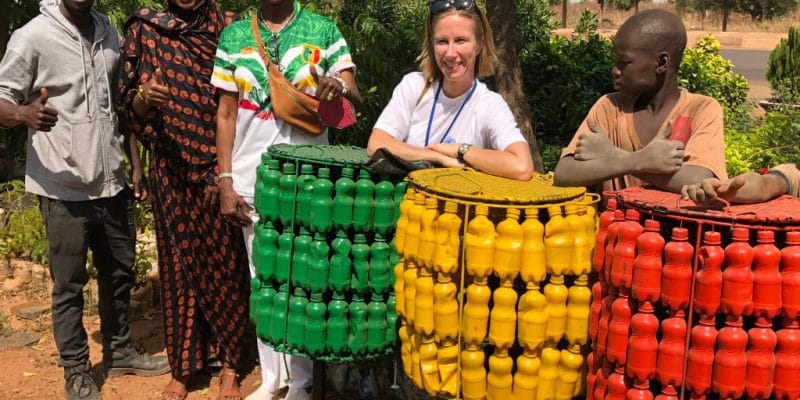In Bamako, health and the environment will go hand in hand following the inauguration of the "Saniya Sira" sports complex built from the recycling of 8 million plastic bags into paving stones. The initiative is an integral part of the "Zero Plastic Bamako" program launched by the Princess Esther Kamatari Foundation and supported by the United Nations Multidimensional Integrated Stabilization Mission in Mali (MINUSMA).
Plastic waste management is one of the major urban challenges in developing countries, where population growth and the diversity of socio-economic activities are at the root of environmental degradation. To reverse the trend of their proliferation in the streets of Bamako in Mali, a sports complex has been built from 8 million bags, or 60 tons of plastic that have been transformed into paving stones.
The sports infrastructure “Saniya Sira” (healthy course in local language, editor’s note) which includes a course of 800 meters and a rest area of 200 m2 is located in the 6th township of the Malian capital, where the international airport of Bamako-Sénou is located. With the help of a Bamako start-up specialized in industrial recycling and technology, several trash cans in the colours of Mali, made of small recycled bottles, have been added along the course. The course is decorated with plants and flowers.
Read also-MALI: A campaign to remove 500,000 tonnes of waste from Bamako and Kati
This initiative is part of the “Bamako Zero Plastic” program carried out by the Princess Esther Kamatari Foundation (a descendant of the Burundian royal dynasty Ganwa, editor’s note) with financial support from the United Nations Multidimensional Integrated Stabilization Mission in Mali (MINUSMA) worth 80,000 euros (about 53 million CFA francs).
“As in other African cities, where waste management is insufficient, in Bamako there are piles of garbage, gutters transformed into dumping grounds, waste burned in the streets and, if the lack of financial means seems to be the main cause according to the actors of waste management, a better policy is essential and possible,” says Princess Esther Kamatari who has implemented this ecological approach.
Ecology to promote development
Mali enacted a law in 2013 banning the import, manufacture, marketing and use of single-use plastic packaging in the country. Yet the capital city of Bamako produces 17,000 tons of plastic waste each year. The Malian authorities are opting for a marriage of reason between ecology and development.
According to the Minister of Environment, Sanitation and Sustainable Development, Modibo Koné, this ecological approach in this city of 3 million Bamakois is a source of employment for women and young people, as well as for engineers from innovative local start-ups that have entered this sanitation chain, from collection, storage to the manufacture of paving stones and the preparation of the site for the laying of these stones.
As part of their contribution to the fight against plastic pollution in Bamako, the “Saniya Sira” project involved 400 women who each won the sum of 600 euros (400,000 CFA francs). This action is in line with the 1st and 5th Sustainable Development Goals (SDGs) which aim, among other things, to eliminate extreme poverty and empower women by 2030.
Benoit-Ivan Wansi






